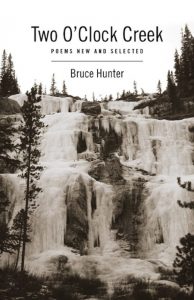Bruce Hunter
Bruce Hunter, Two O’clock Creek
All that summer couldn’t understand
in the morning as we drove through
dry boulder wash, the matter-of-fact sign nailed
on a creekside spruce:
TWO O’CLOCK CREEK
– and no water anywhere.
Me twelve with Uncle John on patrol
in the forestry truck.
Him hungover and with that temper,
you didn’t push the obvious.
But that sign taunted me.
As first ranger in the district
he named things factually like an explorer:
Abraham flats after a Stony chief.
The map men kept that one,
thinking it Biblical and it was, in a way.
But each afternoon, driving back, sure enough
at two o’clock, there was a creek
roaring cold under the wheels.
Finally, a week before school and the city, I asked,
a prairie boy baffled by the magic of water
appearing anywhere, and on time.
John smirks, swings the Ford
into the ditch and around,
a madman on his way to a holy place.
I hang on as we climb, boulders boil in the fenders.
Double-clutching down into first
onto a horsetrail, then straight up on foot,
a pika whistling at us. Beginning to wish
I hadn’t asked about that sign.
Over the alpine meadows
a plateau where mountain sheep startle
at the two of us covered in dust.
He draws his pipe across the crowfoot of a glacier
tipped from the distant sky, a white glory
scooped into the sunslope
in a sheltered cowl of rock.
John points to a green waterfall
spilling over the lip.
Here sky meets land
and water is hard as rock this high
and liquid ice to the tongue and our aching feet.
Where all the rivers begin,
the Whitegoat, the Bighorn
after the sheep behind us.
Headwaters of the upper Saskatchewan
I knew from schoolroom maps,
coursing down to Hudson Bay
with canoes full of coureur de bois.
Below us, blonde grass riffles on Kootenay Plains,
clouds jam the chute the weather comes through
where the Kootenay descended to barter the Cree.
Up here the wind howls cold.
And I saw how a few hours of daylight
warms the ice to a trickle that becomes a torrent
in the glacier’s pit. The mystery of rivers
is that they come from somewhere
between earth and sky.
wrung by the sun from clouds and wind.
But when night comes, Two O’clock Creek sleeps,
the waterfall waits frozen, and all the years
since I learned how rivers are made,
this is the place I come to in my dreams
between the highest point of land and the sky,
so I can drink from the clouds.
Bruce Hunter, Il ruscello delle due
traduzione di Sandro Pecchiari
Durante quell’estate proprio non capivo,
le mattine mentre si attraversava
un letto secco, quell’insegna sbrigativa
inchiodata su un abete della riva:
RUSCELLO DELLE DUE
– senza una goccia d’acqua.
Dodicenne, di pattuglia con zio John
nella camionetta della forestale.
Lui con un umore da dopo sbronza
che non si aspettava scocciature.
Ma quel cartello mi stuzzicava.
Da primo ranger del distretto
nominava le cose basandosi sui fatti, come un esploratore:
le Abraham flats da un capo Stony.
I cartografi l’avevano considerato
nome biblico, lo era in qualche modo.
Ma ogni pomeriggio, ritornando, puntuale
alle due c’era un ruscello
che rombava freddo tra le ruote.
La settimana prima della scuola in città, alla fine l’ho chiesto,
un ragazzo della prateria ammaliato dall’acqua
che scaturiva dappertutto puntuale.
John sorride, ammicca, inverte la Ford
nel fosso e torna indietro,
un folle diretto verso un luogo sacro.
Mi tengo forte nella salita, i sassi martellano i paraurti.
Con la doppietta in prima
dentro un sentiero da cavalli , poi su dritti a piedi
un pica che ci fischia. Quasi pentito
di aver chiesto del cartello.
Sopra i prati alpini
un pianoro dove i bighorn si allarmano
a vederci così tutti impolverati.
Fuma la pipa tra i ranuncoli del ghiacciaio
con il cielo lontano là in cima, una gloria bianca
raccolta dentro un pendio assolato
in una cappa di roccia riparata.
John indica una cascata verde
che trabocca oltre il bordo.
Qui il cielo incontra la terra
e l’acqua è dura come questa alta roccia
e ghiaccio liquido sulla lingua e piedi doloranti.
Dove tutti i fiumi hanno inizio,
il Whitegoat, il Bighorn
oltre le pecore dietro di noi.
Sorgenti del nord Saskatchewan
che sapevo dalle mappe nella scuola,
a scorrere giù verso l’Hudson Bay
le canoe piene di contrabbandieri.
Sotto di noi, barre d’erba secca sulle Kootenay Plains,
le nuvole addensano il precipitare del tempo
dove i Kootenay scendevano a barattare con i Cree.
Quassù le raffiche urlano fredde.
Così ho visto come poche ore di luce
sciolgano il ghiaccio che si fa torrente
nell’incavo del ghiacciaio. Il mistero dei fiumi
è che vengono da una zona
tra la terra e il cielo,
che il sole strizza dalle nuvole e dal vento.
Ma nella notte il Ruscello delle Due dorme,
la cascata attende congelata e tutti gli anni
da quando so come si fanno i fiumi,
questo è il posto che visito nei sogni
tra il punto più alto della terra e il cielo,
così posso abbeverarmi dalle nuvole.
Qui il file audio, lettura in lingua originale di Sandro Pecchiari:
Note:
Stoney: tribù autoctone della provincia di Alberta, Canada
Kootenay (in Canada) and Kootenai (negli Stati Uniti): tribù indigene del vasto territorio che si estende dal British Columbia meridionale, l’Alberta del sud-ovest, parti degli stati di Washington, Idaho e Montana occidentale.
Cenni biografici:
Bruce Hunter è l’autore di cinque libri di poesie, un romanzo e una raccolta di short stories. Tra i quali Coming Home From Home (2000), la sua terza raccolta di poesia, finalista al 1997 CBC/Saturday Night literary competition.
In the Bear’s House (2009), romanzo, vincitore del Canadian Rockies prize al Banff Mountain Book Festival.
Two O’Clock Creek – Poems New and Selected (2010) vince l’Acorn-Plantos Peoples’ Poetry Award.
clicca nell’immagine per ordinare il libro:
